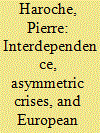| Srl | Item |
| 1 |
ID:
052326


|
|
|
|
|
| Publication |
June 2004.
|
| Summary/Abstract |
The policies of Australia's current government have been so close to the United States as to invite comparisons to an Australian 'deputy sheriff' executing the interests and policies of a US global marshal. Advocates of the ANZUS alliance disagree, citing the immense politico-strategic benefits Australia extracts from that relationship and insisting that ANZUS objectives are commensurate with a stable and just world order. Recent developments in international security politics such as the Iraq conflict and the persistence of global terrorism may now challenge that proposition and test the Australian electorate's future support for the American alliance. A greater determination by Australia to cultivate a more balanced approach to alliance politics will underwrite its national security interests more effectively than a sustained and rigid adherence to alliance loyalty under any circumstances.
|
|
|
|
|
|
|
|
|
|
|
|
|
|
|
|
| 2 |
ID:
154931


|
|
|
|
|
| Summary/Abstract |
Whatever motivations lie behind North Korea’s nuclear and missile programs, North
Korea has been aware that further nuclear and missile tests would incur increasingly
harsh international sanctions. In order to survive the sanctions, North Korea needs
to entrap China to its side, for the North Korean economy is highly dependent upon
China. In this context, this article argues that North Korea intentionally increases
the level of its nuclear and missile threat in order to entrap China (thus, reducing its
fear of being abandoned by China). That is, North Korea has elaborated its coercive
diplomacy in order to press China to show a strong commitment to their mutual
alliance. In order to develop the above argument, this article proceeds as follows.
First, as an analytical framework, it applies Glenn Snyder’s concept of the linkage
between the alliance game and adversary game to the trilateral relationship among
the United States (along with South Korea), China and North Korea. Second, it
provides an overview of Sino–North Korean relations from 2006 up to the present,
attempting to analyze North Korea’s brinkmanship. Thirdly, it concludes with some
policy implications for future trilateral relations, one of which is that China should
seriously discuss North Korea contingency plans with the United States and South
Korea in order to develop an effective strategy to curb North Korea’s military
adventurism. Paradoxically, this would lead to North Korea’s fully considering
China’s position.
|
|
|
|
|
|
|
|
|
|
|
|
|
|
|
|
| 3 |
ID:
153342


|
|
|
|
|
| Summary/Abstract |
Although international crises are often believed to represent windows of opportunity to strengthen European defence cooperation, recent crises have not seemed to produce a clear convergence of European Union (EU) member states’ security interests. This article seeks to address this puzzle by arguing that European defence cooperation is a response to crises that place European states in a situation of military interdependence. Conversely, asymmetric crises, i.e. crises that affect European states unevenly, encourage those states to maintain their autonomy of action. This theoretical argument is supported by two case studies: the failure of the European Defence Community in the early 1950s and the current difficulties experienced by the EU’s military operations. These two cases illustrate a striking continuity in that, because of (neo)colonial ties in particular, European states are often unevenly affected by international crises, which tends to make defence cooperation less effective.
|
|
|
|
|
|
|
|
|
|
|
|
|
|
|
|
| 4 |
ID:
131268


|
|
|